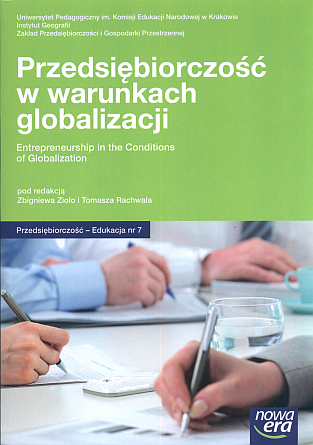Proces kształtowania się korporacji ponadnarodowej Google
DOI:
https://doi.org/10.24917/20833296.7.10Słowa kluczowe:
google, orporacja ponadnarodowaAbstrakt
The formation process of any multinational corporation is driven by mechanisms of competition within global markets. In this modern era of knowledge there is an intensive development of high technology industries, mainly software, which play important roles in the various stages of processing and creation of innovative products and services. The history of Google goes back to 1995 when its founders - Sergey Brin and Larry Page met at Stanford University in California. On 7th September 1998, Google Inc. was officially incorporated. In 2001 Eric Smidt became Chief Executive Officer. In their twelve years of existence, the company maintained major development and was at the forefront of the development of software industry standards. The most profitable and constantly developing services of the corporation are the search engine, which represents more than 80% of the total search market and the advertising services such as AdWords and AdSense. However, the company diversifies its products and systematically enters into new markets in order to comprehensively meet the needs of its customers. Its diversification includes web applications, enterprise services and the market of mobile devices. The various departments of the corporation are located in 70 cities across 39 countries, usually in the capitals of these countries or, if not, in other large cities, which are associated with major public markets. The headquarters of Google is located in Mountain View, California. Most of the departments - twenty three, are located throughout North America and Europe. There are also 16 departments based in Asia. Individual countries have a varying degree of presence of Google offices, the largest being the United States with nineteen, whilst three are located in Poland, in Warsaw, Cracow and Wroclaw. Google has formed an organizational structure whose main task is to improve its competitiveness. Business development strategy is based on innovation, human potential and high quality standards and its mission is to „organize the world’s information and make it universally accessible and useful”. With an effective strategy, Google breaks records in the number of acquired companies. The Corporation has an unusual and interesting organizational culture, which, due to concern for the well-being of employees, ensures high performance. Google’s philosophy is that of developing young, talented individuals capable of self-realization, thus creating a basis for development. In 2009 Google found itself in fourth position in the ranking of “100 Best Companies to Work For” in “Fortune Magazine”. By being faithful to its philosophy and strategy for success, Google has become part of a reality, without which some cannot imagine life. As the company is constantly expanding the range of its services and introducing innovative solutions, it is reasonable to assume that the process of the corporation’s development will be maintained.
Bibliografia
Battelle J., 2006, The Search. How Google and its Rivals Rewrote the Rules of Business and Transformed Our Culture, Wydawnictwo Naukowe PWN, Warszawa.
Boguś M., 2010, Kształtowanie się korporacji ponadnarodowej Google, praca magisterska napisana w Zakładzie Przedsiębiorczości i Gospodarki Przestrzennej, Instytut Geografii Uniwersytetu Pedagogicznego im. Komisji Edukacji Narodowej w Krakowie pod kierunkiem prof. Z. Zioło.
Grynkiewicz T., 2010, Giganci IT mają w gotówce 188 mld dol., „Gazeta Wyborcza. Gospodarka”, nr 27.
http://openzone.pl/news,krotka-historia-google,3000.
Kilar W., 2009, Zróżnicowanie potencjału ekonomicznego światowych korporacji [w:] Funkcje przemysłu w kształtowaniu społeczeństwa informacyjnego, Z. Zioło, T. Rachwał (red.), „Prace Komisji Geografii Przemysłu PTG”, nr 13, Komisja Geografii Przemysłu PTG i Instytut Geografii Uniwersytetu Pedagogicznego w Krakowie, Warszawa–Kraków, s. 110–121.
Maleńczak P., Potrzeba matką wynalazku (i sukcesu)!, www.strategie.biz.pl/2009/02/23/potrzeba- -matka-wynalazku-i-sukcesu/ 7. Olszak C., Ziemba E., 2007, Strategie i modele gospodarki elektronicznej, Wydawnictwo Naukowe PWN, Warszawa.
Piórko K., 2008, „Władza” korporacji transnarodowych w stosunkach międzynarodowych, Wydawnictwo Naukowe GRADO, Toruń.
Tobolska A., 2006, Strategie globalne a nowe formy organizacji przedsiębiorstw transnarodowych [w:] Rola przedsiębiorczości w podnoszeniu konkurencyjności społeczeństwa i gospodarki, Z. Zioło, T. Rachwał (red.), „Przedsiębiorczość – Edukacja”, nr 2, Nowa Era, Zakład Przedsiębiorczości i Gospodarki Przestrzennej Instytutu Geografii Akademii Pedagogicznej w Krakowie, Warszawa–Kraków.
Vise D., Malseed M., 2007, The Google Story, Wydawnictwo Dolnośląskie, Wrocław.
Wieloński A., 2003, Przemysł nowej gospodarki [w:] Przemysł w procesie globalizacji, Z. Zioło, Z. Makieła (red.), „Prace Komisji Geografii Przemysłu PTG”, nr 6, Komisja Geografii Przemysłu PTG w Warszawie i Zakład Przedsiębiorczości i Gospodarki Przestrzennej Instytutu Geografii Akademii Pedagogicznej w Krakowie, Warszawa–Kraków, s. 21–26.
www.google.com
Zioło Z., 2001, Struktura branżowa i koncentracja przestrzenna wiodących światowych firm przemysłowych [w:] Problemy przemian struktur przemysłowych a w procesie wdrażania reguł gospodarki rynkowej, Z. Zioło (red.), „Prace Komisji Geografii Przemysłu PTG”, nr 3, Komisja Geografii Przemysłu Polskiego Towarzystwa Geograficznego w Warszawie, Wydział Ekonomiczny UMCS w Lublinie – Filia w Rzeszowie, Warszawa–Kraków–Rzeszów, s. 29–41.
Zioło Z., 2009, Procesy kształtowania się światowych korporacji i ich wpływ na otoczenie [w:] Wpływ procesów globalizacji i integracji europejskiej na transformacje struktur przemysłowych, Z. Zioło, T. Rachwał (red.), „Prace Komisji Geografii Przemysłu PTG”, nr 12, Komisja Geografii Przemysłu PTG i Zakład Przedsiębiorczości i Gospodarki Przestrzennej Instytutu Geografii Akademii Pedagogicznej w Krakowie, Warszawa–Kraków.
Zorska A., 2002, Korporacje międzynarodowe w Polsce. Wyzwania w dobie globalizacji i regionalizacji, A. Zorska (red.), Difin, Warszawa.
Pobrania
Opublikowane
Jak cytować
Numer
Dział
Licencja
Artykuły publikowane są zgodnie z warunkami licencji Creative Commons (CC BY-ND 4.0; uznanie autorstwa-bez utworów zależnych).

